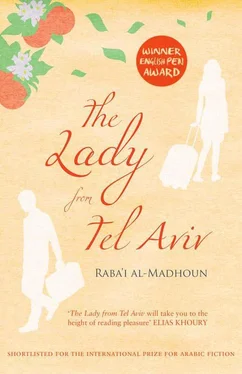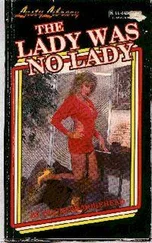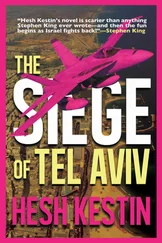My seatmate takes refuge in silence. She does not put up any resistance to my last attack, which, in any case, was not one I had planned to make. Instead, she sends whatever anxiety she is feeling out into the night sky. She studies herself in the blank mirror. At the same time, her hand creeps over and gently clasps mine.
Returning from her distant musings, she twists to face me. Her fingers send warmth across my hand. ‘I hope you have no delays in seeing your mother and that you have a good time together. I hope that there can be peace between us and the Palestinians. We’re tired of the situation, all of us. The problem is not the people, it’s the politicians. Our politicians and yours. Sharon doesn’t want peace, nor does Arafat.’
As she speaks, she retracts her hand and shifts her weight onto the forearm that rests between our seats.
The extremists on your side and the extremists on ours. They always say that when they want to parse the crime and reapportion blame for the shedding of Palestinian blood. Your extremists and our extremists. Fine. I’d love to answer her with a simple quote from Mahmoud Darwish: get out. Leave our lands. Evacuate our territories and quit our sea. Get out of our wheat, our salt, our wounds. Leave the vocabulary of our memory. Then — and only then — can you take care of your extremists while we take care of ours.
I say none of this to her. What is the use of dredging up the entire Middle Eastern conflict in a fleeting meeting between two strangers sitting next to each other on a flight? When I do talk, I say something else entirely: I tell her that I hope Palestinians and Israelis might leave the battlefield behind them and learn to share a life together. I hope that one day she and I might walk together along a long road with no checkpoints between us. No assassinations and no suicide bombers, no soldiers and no militants, no Zionism and no Palestinian national liberation, no Intifadas and no settlements, no Sharons and no Arafats, no Abu Mazens and no Shaul Mofazes, no warlords, no settlers, no Apache helicopters, no F-16s and no car bombs. I hope that we could be just two regular passengers passing the night on any flight.
After going over the last of my misgivings, I ask: ‘By the way, you haven’t told me your name yet.’
‘My name’s Dana. Dana Newman, but my friends call me Dana Ahuva.’
‘Dana Beloved. It’s got a ring to it. It reminds me of Dana International. Remember him — or, I mean, her?’
Laughing, she comments: ‘Yeah. But unlike her, I’m not interested in a sex change.’
Then she turns to me and asks me what my name is.
‘Walid Dahman,’ I say.
She repeats my name after me, as if she has heard it before, ‘Walid. Walid.’
‘Do you know me, Ms. Dana?’
Reluctantly, she lets out a laugh, ‘Not at all. I’m just listening to the music of your name. Walid.’ Each time she murmurs it, she stretches it out. Then she wonders aloud. ‘Tell me about yourself, Walid. What do you do?’
She smiles and her clear eyes sparkle. As I respond, she clutches her arms around her chest and listens intently.
‘I’m married to an English woman, and we have two boys. I’m a journalist. I work for Akhbar al-Arab , it’s an international Arabic newspaper out of London. I also write different kinds of things.’
‘Like what?’
‘I write about politics and culture and the arts. I’ve published three novels — I’m working on my fourth right now.’
‘Have you finished writing it?’
‘I’m not happy with the title I’ve chosen, and I haven’t given it a proper conclusion. In any case, I’m going to revise some of the scenes. I might add a number of details.’
Before we get into some kind of ‘chat-with-the-author’ discussion, I add: ‘I’ve given it a number of titles actually, but I haven’t been able to decide on one yet. Here are some: Via Israel. Land of Transgression. Shadow Homeland. Twenty More Days. The Story of Adel El-Bashity . I’ve thought about giving the novel the kind of ending that precludes any sequels. Or the kind of conclusion that looks like the beginning of another. Or the kind of ending that leaves the door open to all sorts of speculation about what just happened or what might happen next. Or maybe I should leave it up to readers to decide how the story ends.’
‘I don’t understand,’ says Dana.
‘Of course, of course. I haven’t given you a sense of what the novel is about and who the characters are. Luckily, we’ve got a long night ahead of us … We’re riding in a caravan, suspended in the sky — by pillars of illusion! The best I can do is mention some of the highlights of the book. Just give me a second.’
I get out of my seat and stand in the aisle amidst a chorus of breathing souls. Here and there, I make out whispers amidst the loud sawing of snorers. I swing my arms and legs a bit and take a few steps down the aisle and come back.
‘There. That’s much better. Let’s get back to the story. Do you still want to hear it?’
‘Of course I do. Please begin.’
‘Adel El-Bashity is a Palestinian with German citizenship. He works in a branch of Deutsche Bank in Frankfurt. He returns to Gaza thirty years after going abroad for his education. He goes via Ben Gurion Airport, then through Erez crossing. When Adel was nineteen, he was in love with the girl next door, Leila Dahman. In reality, she’s based on one of my relatives. All the Dahmans in Gaza are related to us. Back when he enrolled in the university in Frankfurt, he’d promised himself that he’d marry no one but Leila. For her part, she promised to wait for him to finish his studies and return. But Adel never did return. The ’67 war breaks out and Gaza falls under occupation. He doesn’t come back. He decides to continue his studies and gets an MBA.
‘Leila’s now forty-eight years old. She awakes after a long sleep inside the heart of this man who is just over fifty. And this man’s heart now itself awakes after a long sleep and begins to beat again.
‘When it becomes possible for Adel to return, he decides to go to Gaza and search for Leila. We need each other now. There’s enough life left in us for this love to last. These are the words he murmurs to himself the day he walks out of his apartment on his way to Frankfurt airport.
‘In the airplane to Tel Aviv, Adel meets Arna Katsoff. She’s an Israeli woman in her fifties, a professor of political science at Hebrew University. She tells him that she’s just spent a few days in Washington DC, delivering an invited lecture at Georgetown University. Her talk was about the latest developments in the Middle Eastern conflict, and prospects for peace in the region. She’d come to Frankfurt for only a couple of days during which time she’d visited the Jewish Museum and the Judengasse Museum nearby. She came to Frankfurt as part of a programme she’d arranged for herself to visit sites in the history of anti-Jewish persecution.
‘Arna tells Adel about what she saw in both museums, and about the life of Jews in the Judengasse, one of the oldest Jewish ghettos in Germany. She talks to Adel about how Frankfurt’s Jewish community suffered during the Holocaust. Adel feels that Arna has chosen from the outset to talk to him primarily through the lens of Jewish suffering, even though neither he nor his forefathers had anything to do with this history — except insofar as he and his family, like all other Palestinians, were themselves transformed into its indirect victims. When he speaks to her, he tells her about how the immigration of European Jews created multiple tragedies for Palestinians, tragedies that culminated in the Nakba of 1948, and the expulsion of his family and their relocation to the refugee camps of Gaza, and then again, in the occupation of the rest of Palestine, which has gone on for thirty-eight years.
Читать дальше












